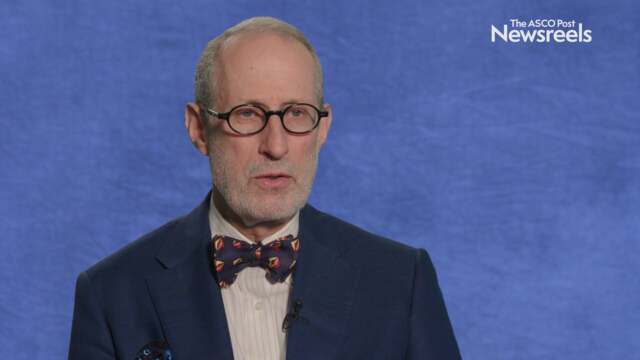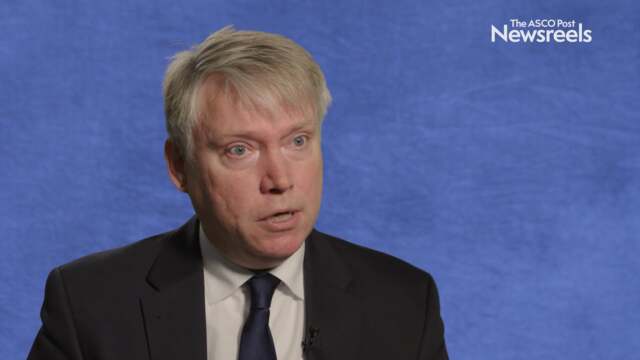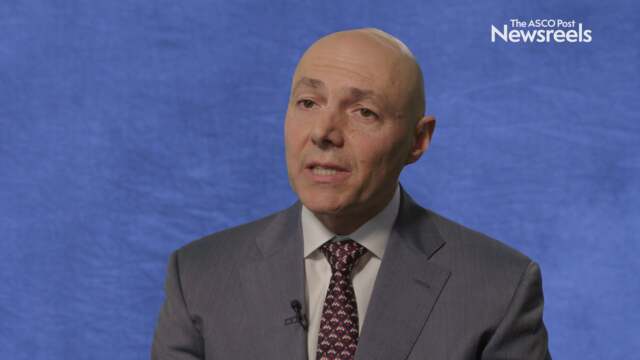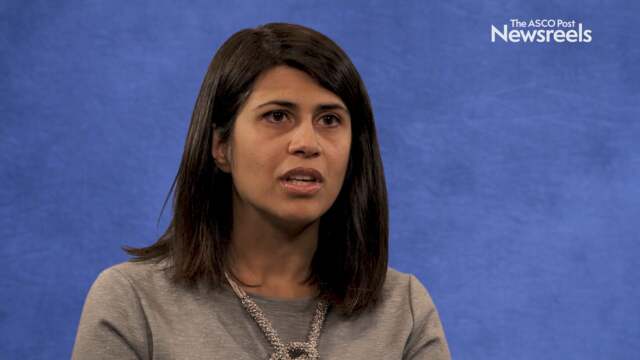Jeffrey S. Weber, MD, PhD, on Discontinuing Immunotherapy: When Is the Right Time?
Jeffrey S. Weber, MD, PhD, of the NYU Langone Perlmutter Cancer Center, discusses how long people with melanoma should be treated with PD-1 blockade and the data on remission rates.
Johan F. Vansteenkiste, MD, PhD, on NSCLC: Immunotherapy and Targeted Treatments
Johan F. Vansteenkiste, MD, PhD, of Catholic University Leuven, summarizes a session he co-chaired that included discussion of translating advances in stage IV disease to nonmetastatic lung cancer, TKI approaches in early-stage disease, and integrating immunotherapy and TKIs in stage III disease management.
Martin Reck, MD, PhD, on Immunotherapy for Thoracic Malignancies: Expert Perspective
Martin Reck, MD, PhD, of the LungenClinic, discusses recent updates on biomarkers beyond PD-L1 expression; mechanisms and management of resistance; as well as combinations and novel approaches in lung cancer.
Ezra E.W. Cohen, MD, on Head and Neck Cancer: Using Curative Immunotherapy
Ezra E.W. Cohen, MD, of the University of California, San Diego, discusses the effectiveness of anti–PD-1 therapy in patients with recurrent head and neck cancer and the studies that might help predict who will benefit, how to combine agents, and ways to reduce long-term toxicity.
Matti S. Aapro, MD, on Immunotherapy in Older Patients
Matti S. Aapro, MD, of the Genolier Cancer Centre, discusses the optimal treatment and supportive care for older patients with cancer, including the importance of maintaining dose density and intensity as well as monitoring toxicity.
Regardless of Taxane Used, Pembrolizumab Plus Chemotherapy Improves Survival in Squamous NSCLC
The addition of pembrolizumab (Keytruda) to a standard platinum doublet as first-line therapy improved overall and progression-free survival in patients with metastatic squamous non–small cell lung cancer (NSCLC), in the primary analysis of KEYNOTE-407.1,2 Furthermore, it did not seem to matter...
Durvalumab Improves Overall Survival in Unresectable Stage III NSCLC
Several lung cancer trials have shown prolonged progression-free survival with checkpoint inhibitor therapy. For the first time, the phase III PACIFIC trial has found an overall survival benefit for the selective programmed cell death ligand 1 (PD-L1) checkpoint inhibitor durvalumab (Imfinzi) vs...
Adoptive T-Cell Therapy for Progressive Multifocal Leukoencephalopathy
An emerging treatment known as adoptive T-cell therapy has proven effective in a phase II clinical trial for treating progressive multifocal leukoencephalopathy (PML), a rare and often fatal brain infection sometimes observed in patients with cancer and other diseases in which the immune...
Small Study of Neoadjuvant Combination Checkpoint Blockade in High-Risk Stage III Melanoma
Neoadjuvant combination checkpoint blockade showed activity among patients with high-risk stage III melanoma in a small study. However, a high incidence of side effects caused the trial to be closed early. These results were published by Amaria et al in Nature Medicine. The phase II...
KEYNOTE-407: First-Line Pembrolizumab Plus Chemotherapy in Metastatic Squamous NSCLC
As reported at the recent International Association for the Study of Lung Cancer 19th World Conference on Lung Cancer and in The New England Journal of Medicine by Paz-Ares et al, the phase III KEYNOTE-407 trial has shown that the addition of pembrolizumab to platinum-based chemotherapy...
Epacadostat Plus Anti–PD-1 Immunotherapy in Advanced Solid Tumors
As reported by Mitchell et al in the Journal of Clinical Oncology, the combination of the oral indoleamine 2,3-dioxygenase 1 (IDO1) enzyme inhibitor epacadostat and the anti–programmed cell death protein 1 (PD-1) therapy pembrolizumab (Keytruda) showed activity in advanced solid tumors in the ...
James Allison, PhD, and Tasuku Honjo, MD, PhD, Win 2018 Nobel Prize in Physiology or Medicine
JAMES ALLISON, PHD, Chair of Immunology and Executive Director of the Immunotherapy Platform at The University of Texas MD Anderson Cancer Center, and Tasuku Honjo, MD, PhD, Distinguished Professor at the Kyoto University Institute for Advanced Study and Professor of Immunology and Genomic Medicine ...
Immune Checkpoint Blockade and Tumor-Specific Vaccine for Incurable HPV16-Related Cancer
In a single-center phase II study reported in JAMA Oncology, Massarelli et al found combining tumor-specific vaccine and nivolumab (Opdivo) showed evidence of activity in incurable human papillomavirus (HPV) 16–related cancer. The therapeutic vaccine, ISA 101, induces HPV-specific T cells....
DNA Vaccine Leads to Immune Responses in HPV-Related Head and Neck Cancer in Small Study
A therapeutic vaccine may boost antibodies and T cells, helping them infiltrate human papillomavirus (HPV)-related head and neck cancer tumors. Researchers from the Abramson Cancer Center of the University of Pennsylvania tested the immunotherapy approach in two groups of patients with...
Long-Term Outcomes With Anti–PD-L1 Treatment in Metastatic Triple-Negative Breast Cancer
In a long-term follow-up of a phase I trial reported in JAMA Oncology, Emens et al found that single-agent atezolizumab (Tecentriq) produced enduring benefit in patients with metastatic triple-negative breast cancer after stable or responding disease and in first-line treatment. Study Details In...
No Survival Benefit With Avelumab vs Docetaxel in Platinum-Treated, Advanced, PD-L1–Positive NSCLC
As reported in The Lancet Oncology by Barlesi et al, the phase III JAVELIN Lung 200 trial has shown no overall survival benefit with avelumab (Bavencio) vs docetaxel in patients with platinum pretreated programmed cell death ligand 1 (PD-L1)–positive advanced non–small cell lung cancer...
Addition of a CTLA-4–Targeted Therapy to a Checkpoint Inhibitor in Ovarian Cancer
An analysis of the NRG Oncology clinical trial NRG-GY003 suggests that adding ipilimumab (Yervoy), a monoclonal antibody that targets the protein receptor cytotoxic T-lymphocyte–associated protein 4 (CTLA-4), to a regimen with the checkpoint inhibitor nivolumab (Opdivo) could improve response ...
Bacterial Therapy Tolerable, Shows Early Activity in Patients With Advanced Solid Tumors
A phase I clinical trial investigating the use of bacterial Clostridium novyi-NT spores as an injectable monotherapy had manageable toxicities and showed early clinical efficacy in patients with treatment-refractory solid tumor malignancies, according to data presented at the CRI-CIMT-EATI-AACR...
Patient-Partnered Genomics Study Identifies Immunotherapy as a Potential Treatment for Angiosarcomas
Angiosarcoma of the head, face, neck, or scalp is a rare cancer associated with high rates of local recurrence, distant metastasis, and poor prognosis. Because angiosarcoma is so rare, it is difficult to conduct large-scale research in the cancer. To address this issue, the Broad Institute of MIT...
Cancer Vaccine Shows Clinical Benefit in Phase I Study of Patients With HER2-Positive Cancers
A preclinical study showing that a vaccination with a recombinant adenovirus expressing a truncated ErbB-2 antigen can cure advanced established murine breast cancer as well as extensive established metastatic lung cancer led to the launch of a small phase I study investigating a therapeutic cancer ...
Frederick L. Locke, MD, on CAR T-Cell Therapy: Major Milestones
Frederick L. Locke, MD, of Moffitt Cancer Center, discusses the key studies behind the development of CAR T cells, major adverse events and management strategies, and the potential of this revolutionary treatment.
Reem Karmali, MD, on Lymphomas and CAR T-Cell Therapy
Reem Karmali, MD, of the Robert H. Lurie Comprehensive Cancer Center of Northwestern University, discusses CAR T-cell therapy for relapsed/refractory DLBCL and other subtypes of lymphomas, ways to manage toxicities, and how to integrate this treatment into care plans.
WCLC 2018: PACIFIC Trial: Overall Survival With Durvalumab After Chemoradiotherapy in Unresectable Stage III NSCLC
As reported at the current International Association for the Study of Lung Cancer 19th World Conference on Lung Cancer (Abstract PL02.01) and in The New England Journal of Medicine by Antonia et al, the phase III PACIFIC trial has shown significantly improved overall survival—a...
A Journey Through the Immune System
Although the basic concept of using the body’s immune defense mechanisms to fight cancer has been around for centuries, the idea of using immunotherapy in cancer, in general, returned to prominence when Dr. Thomas Burnet first proposed the theory of cancer immunosurveillance in 1957. Despite...
FDA Accepts sBLA for Pembrolizumab Monotherapy in First-Line Treatment of Locally Advanced or Metastatic PD-L1–Expressing NSCLC
The U.S. Food and Drug Administration (FDA) granted Priority Review to a new supplemental biologics license application (sBLA) seeking approval for pembrolizumab (Keytruda) as monotherapy for first-line treatment of locally advanced or metastatic nonsquamous or squamous non–small cell lung...
Hyperprogressive Disease in Advanced NSCLC Treated With PD-1/PD-L1 Inhibitors
In a French study reported in JAMA Oncology, Ferrara et al found that hyperprogressive disease appeared to be more common with programmed cell death protein 1 (PD-1)/programmed cell death ligand 1 (PD-L1) inhibitor treatment than single-agent chemotherapy among previously treated patients with...
Sequential vs Concurrent Neoadjuvant Therapy in HER2-Positive Breast Cancer
As reported in JAMA Oncology by Buzdar et al, the phase III ACOSOG Z1041 (Alliance) trial showed no difference in disease-free or overall survival with sequential vs concurrent neoadjuvant anthracycline and trastuzumab in patients with operable HER2-positive breast cancer. An earlier report from...
Avelumab Plus Axitinib in Previously Untreated Patients With Advanced Kidney Cancer
The results of the pivotal phase III JAVELIN Renal 101 study—which evaluated avelumab (Bavencio) in combination with axitinib (Inlyta) compared with sunitinib (Sutent) as initial therapy for patients with advanced renal cell carcinoma—were recently announced. As part of a planned...
CAR T-Cell Therapy for CLL
A pair of new studies from researchers at the Abramson Cancer Center of the University of Pennsylvania are shedding light on why patients with advanced chronic lymphocytic leukemia (CLL) respond or do not respond to chimeric antigen receptor (CAR) T-cell therapy. Although CAR T-cell therapy is...
Pembrolizumab for Advanced Cervical Cancer Progressing During or After Chemotherapy
In June 2018, pembrolizumab (Keytruda) was approved for the treatment of patients with recurrent or metastatic cervical cancer with disease progression on or after chemotherapy whose tumors express programmed cell death ligand 1 (PD-L1; combined positive score [CPS] ≥ 1), as determined by a U.S....
Addition of Bevacizumab to Neoadjuvant Therapy in BRCA1/2-Mutant Triple-Negative Breast Cancer
In an analysis from the GeparQuinto trial reported in the Journal of Clinical Oncology, Peter A. Fasching, MD, of Erlangen University Hospital, Comprehensive Cancer Center Erlangen-EMN, and colleagues found that the addition of bevacizumab (Avastin) to neoadjuvant chemotherapy increased the...
Pembrolizumab in Relapsed or Refractory Primary Mediastinal Large B-Cell Lymphoma
In the Clinic provides overviews of novel oncology agents, addressing indications, mechanisms of action, administration recommendations, safety profiles, and other essential information needed for the appropriate clinical use of these drugs. On June 13, 2018, pembrolizumab (Keytruda) was granted...
Update on Clinical Trials of Novel Therapies
Long-term follow-up data on axicabtagene ciloleucel (Yescarta) in lymphoma, potential partners for nivolumab (Opdivo) in solid tumors, and a targeted agent for RET-altered cancers were featured during the developmental therapeutics program at the 2018 ASCO Annual Meeting. At the Best of ASCO...
Uncommon Lethal Complications of Immune Checkpoint Inhibitors
In a systematic review and meta-analysis reported in JAMA Oncology, Wang et al identified frequency and types of fatal toxic effects in patients receiving immune checkpoint inhibitor therapy. Study Details The study involved analysis of fatal immune checkpoint inhibitor–associated toxic...
Pertuzumab and Trastuzumab Plus Chemotherapy in HER2-Positive, Metastatic Gastric or Gastroesophageal Junction Cancer
As reported in The Lancet Oncology by Tabernero et al, the phase III JACOB trial showed no significant overall survival benefit of adding pertuzumab (Perjeta) to trastuzumab (Herceptin) plus chemotherapy in first-line treatment of HER2-positive metastatic gastric or gastroesophageal junction...
Mismatch Repair Mutations and Immunotherapy in Prostate Cancer
A group of men with especially aggressive prostate cancer may respond unusually well to immunotherapy, according to a study published by Rodrigues et al in the Journal of Clinical Investigation. The research offers the possibility of effective treatment, with clinical trials already underway. An...
Bevacizumab Treatment Beyond Disease Progression in Advanced NSCLC
As reported in JAMA Oncology by Gridelli et al, the phase IIIB AvaALL trial did not show improved overall survival with continued bevacizumab (Avastin) treatment beyond disease progression in patients with advanced non–small cell lung cancer (NSCLC), although some improvements in subsequent...
Expert Point of View: Ian Olver, MD, PhD
COMMENTING ON the importance of this topic at a press conference during the 2018 Multinational Association of Supportive Care in Cancer (MASCC)/International Society of Oral Oncology (ISOO) Annual Meeting, Ian Olver, MD, PhD, Immediate Past President of MASCC and Director of the University of...
Cardiac Issues Related to Checkpoint Inhibitors Still Largely Understudied
IMMUNE CHECKPOINT inhibitors represent a giant step forward in the treatment of many cancers, and as these agents have “come of age” in the past few years, so has the collective understanding of their potential for causing adverse events. Although checkpoint inhibitors are known to be associated...
Immune Checkpoint Inhibitors in Patients With HIV-Associated Kaposi Sarcoma
Widespread use of antiretroviral therapy in the treatment of patients infected with human immunodeficiency virus (HIV) has led to a decline in the incidence of HIV-related Kaposi sarcoma, an incurable malignancy associated with HIV. Nevertheless, about 15% of these patients will go on to...
Radiomic Signature for CD8 Cell Tumor Infiltration and Response to Treatment
In a study reported in The Lancet Oncology, Sun et al developed a radiomic signature of infiltrating CD8 cells that could identify tumor immune phenotype and help predict outcome of programmed cell death protein 1 (PD-1)/programmed cell death ligand 1 (PD-L1) inhibitor treatment. Study Details...
Adding First-Line Pertuzumab to Trastuzumab Plus Aromatase Inhibitor in Advanced Breast Cancer
In the phase II PERTAIN trial reported in the Journal of Clinical Oncology, Rimawi et al found that adding pertuzumab to trastuzumab plus an aromatase inhibitor improved progression-free survival in patients with advanced HER2-positive, hormone receptor–positive breast cancer. Study Details ...
Immunotherapy Combination in Melanoma Brain Metastases
In the phase II CheckMate 204 study reported in The New England Journal of Medicine, Tawbi et al found that combined nivolumab (Opdivo) and ipilimumab (Yervoy) produced a high rate of intracranial clinical benefit in patients with melanoma brain metastases. Study Details The study included 94...
Immunotherapy in Advanced Esophagogastric Cancer
As reported in the Journal of Clinical Oncology by Janjigian et al, the phase I/II CheckMate-032 study has shown activity of nivolumab (Opdivo) and nivolumab plus ipilimumab (Yervoy) in advanced esophagogastric cancer. In the esophagogastric cohort of the multicohort study, 160 patients (who...
FDA Accepts sBLA for Elotuzumab Plus Pomalidomide and Low-Dose Dexamethasone in Patients With Relapsed or Refractory Multiple Myeloma
The U.S. Food and Drug Administration (FDA) recently accepted a supplemental biologics license application (sBLA) for elotuzumab (Empliciti) in combination with pomalidomide (Pomalyst) and low-dose dexamethasone for the treatment of patients with relapsed or refractory multiple myeloma who...
Baseline Steroids and Efficacy of PD-1/PD-L1 Inhibitors in NSCLC
In a study reported in the Journal of Clinical Oncology, Arbour et al found that baseline treatment with corticosteroids was associated with poorer efficacy of programmed cell death protein 1 (PD-1) or programmed death cell ligand 1 (PD-L1) inhibitors in patients with non–small cell lung...
CAR T-Cell Therapy in Europe: Differing Decisions on Approval of Two Agents
The European Commission (EC) recently approved the chimeric antigen receptor (CAR) T-cell therapy tisagenlecleucel (Kymriah) in the European Union (EU) for the treatment of pediatric and young adult patients up to 25 years of age with B-cell acute lymphoblastic leukemia (ALL) that is...
FDA Approves Ibrutinib Plus Rituximab for Waldenström’s Macroglobulinemia
The U.S. Food and Drug Administration (FDA) has approved ibrutinib (Imbruvica) plus rituximab (Rituxan) for the treatment of adult patients with Waldenström's macroglobulinemia (WM). With this approval, the ibrutinib prescribing information now includes combination use with rituximab,...
Blinatumomab in Adult and Pediatric Patients With B-Cell Precursor Acute Lymphoblastic Leukemia
EARLY IN 2018, blinatumomab (Blincyto) was granted accelerated approval for the treatment of adult and pediatric patients with B-cell precursor acute lymphoblastic leukemia (ALL) in first or second complete remission with minimal residual disease ≥ 0.1%.1,2 Supporting Efficacy Data APPROVAL WAS...
Gene-Expression Predictor for Immunotherapy Response in Melanoma
In a new study, researchers developed a gene expression predictor that can indicate whether melanoma in a specific patient is likely to respond to treatment with immune checkpoint inhibitors. Their research was published by Auslander et al in Nature Medicine. “There is a critical need to be...







